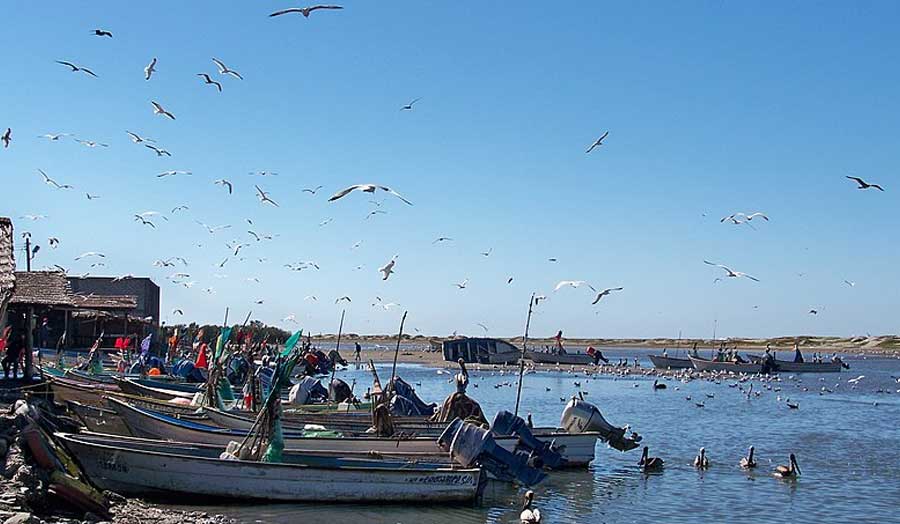Strengthening Indigenous Fisherwomen’s Resilience to Extreme Heat Stress Challenges in Sinaloa
In Mexico, fisheries serve as a vital source of income and food security, especially for coastal Indigenous communities. Fueled by climate change, heat waves' escalating intensity and frequency are significantly disrupting fishing activities and livelihoods. Rural women, particularly those involved in fisheries, are highly vulnerable to heat stress. For example, heat stress directly impacts the quality and shelf life of the catch, leading to substantial losses for fisherwomen and compromising economic stability and food security. This disproportionately affects women, who often play a crucial role in post-harvest processing and sales, exacerbating their vulnerability to climate change and heat-related stress.
Further, the outdoor nature of fishing exposes them to health risks and reduces their productivity. As the primary providers of family food security and income, these women face exacerbated economic and gender disparities due to the increased pressures on natural resources brought on by climate change. Inadequate access to efficient and affordable cooling and healthcare infrastructure further increases their burden.
This project aligns with the UN Sustainable Development Goals (SDGs) and seeks to enhance the socio-economic development of Mexico. It empowers women by recognizing and valuing their knowledge, enhancing their skills, and ensuring their participation in climate adaptation efforts. It challenges gender roles towards achieving gender equality (SDG5) in fishing communities. The focus on building resilience in the face of climate change (SDG13) highlights the value of Traditional Ecological Knowledge and seeks to promote the good health and well-being (SDG3) of women fisherfolk by addressing heat stress-related health risks and empowering women through capacity building and community-driven solutions, fostering healthier lives and greater well-being. The project focuses on empowering marginalised groups like women in fishing communities, which helps reduce inequalities (SDG10) and promotes social inclusion. Finally, the project strengthens bilateral cooperation and partnership (SDG17) between the UK and Mexico to address climate change impacts.
This project is based on a collaboration between London Metropolitan University and Universidad Autónoma de Sinaloa.

Sinaloa, Mexico. Image credit: M.C. Jorge M. Mejía via Wikimedia Commons
Project Team
This project is funded by a British Council Going Global Partnerships: Researcher Challenges Grant
More information
The project contributes to efforts to strengthen women’s resilience to the impacts of climate-induced heat stress by:
- Enhancing the adaptive capacity of fisherwomen through participatory research generating evidence-based insights into the gendered impacts of the heat crisis on their health and livelihoods.
- Supporting Early Career Researchers to co-create culturally relevant, gender-responsive solutions to mitigate heat stress and improve well-being, prioritising women’s leadership and agency.
- Facilitating knowledge exchange and collaboration between UK and Mexican researchers, policymakers, and community stakeholders for cross-cultural learning and sharing best practices.
From the high-altitude of the Himalayas to Africa’s Kalahari, women bear the brunt of the unfolding global climate crisis. Yet where, in climate adaptation and public health efforts, are the voices of European and Mexican women dying in heat waves? Indigenous women in Mexico face treble vulnerability as their ethnicity and gender intersect to create socioeconomic, health and environmental challenges that affect their climate change resilience. Prolonged exposure to extreme heat is a norm for Indigenous fisherwomen in the Guacaporito community in Sinaloa, given that gendered labour and cultural gender norms assign income generation responsibilities to them.
In this project, we explore the escalating gendered impact of the heat crisis on indigenous fisherwomen in the Jitzamuri fishing camp, examining the nexus of health, social and economic challenges amidst climate change. The project aims to establish a community of practice for transnational gender-responsive climate adaptation by prioritising women’s leadership and centring their voices at the core of climate solutions.
Anticipated outputs are as follows:
- Practice toolkit on the gendered heath impact of climate change on indigenous women and girls in Mexico.
- A Challenge prize aimed at developing sustainable cooling solutions explicitly tailored for indigenous and rural women.
- Four day joint virtual workshop.
